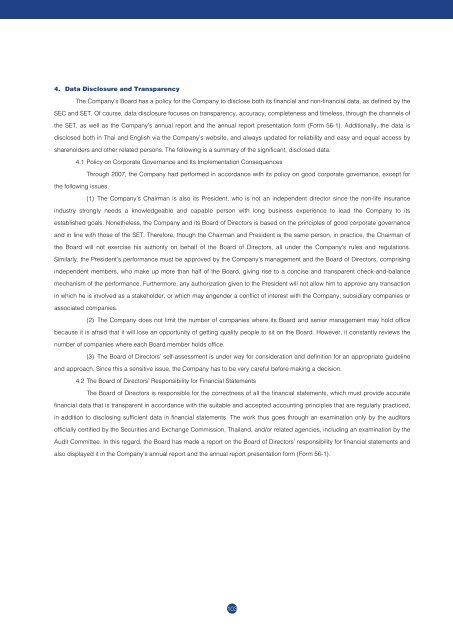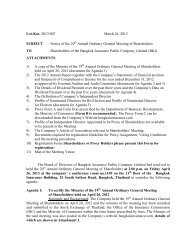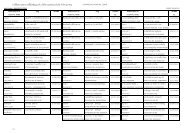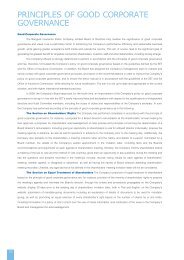Year 2007
Year 2007
Year 2007
Create successful ePaper yourself
Turn your PDF publications into a flip-book with our unique Google optimized e-Paper software.
4. Data Disclosure and Transparency<br />
The Company’s Board has a policy for the Company to disclose both its financial and non-financial data, as defined by the<br />
SEC and SET. Of course, data disclosure focuses on transparency, accuracy, completeness and timeless, through the channels of<br />
the SET, as well as the Company’s annual report and the annual report presentation form (Form 56-1). Additionally, the data is<br />
disclosed both in Thai and English via the Company’s website, and always updated for reliability and easy and equal access by<br />
shareholders and other related persons. The following is a summary of the significant, disclosed data.<br />
4.1 Policy on Corporate Governance and Its Implementation Consequences<br />
Through <strong>2007</strong>, the Company had performed in accordance with its policy on good corporate governance, except for<br />
the following issues.<br />
(1) The Company’s Chairman is also its President, who is not an independent director since the non-life insurance<br />
industry strongly needs a knowledgeable and capable person with long business experience to lead the Company to its<br />
established goals. Nonetheless, the Company and its Board of Directors is based on the principles of good corporate governance<br />
and in line with those of the SET. Therefore, though the Chairman and President is the same person, in practice, the Chairman of<br />
the Board will not exercise his authority on behalf of the Board of Directors, all under the Company’s rules and regulations.<br />
Similarly, the President’s performance must be approved by the Company’s management and the Board of Directors, comprising<br />
independent members, who make up more than half of the Board, giving rise to a concise and transparent check-and-balance<br />
mechanism of the performance. Furthermore, any authorization given to the President will not allow him to approve any transaction<br />
in which he is involved as a stakeholder, or which may engender a conflict of interest with the Company, subsidiary companies or<br />
associated companies.<br />
(2) The Company does not limit the number of companies where its Board and senior management may hold office<br />
because it is afraid that it will lose an opportunity of getting quality people to sit on the Board. However, it constantly reviews the<br />
number of companies where each Board member holds office.<br />
(3) The Board of Directors’ self-assessment is under way for consideration and definition for an appropriate guideline<br />
and approach. Since this a sensitive issue, the Company has to be very careful before making a decision.<br />
4.2 The Board of Directors’ Responsibility for Financial Statements<br />
The Board of Directors is responsible for the correctness of all the financial statements, which must provide accurate<br />
financial data that is transparent in accordance with the suitable and accepted accounting principles that are regularly practiced,<br />
in addition to disclosing sufficient data in financial statements. The work thus goes through an examination only by the auditors<br />
officially certified by the Securities and Exchange Commission, Thailand, and/or related agencies, including an examination by the<br />
Audit Committee. In this regard, the Board has made a report on the Board of Directors’ responsibility for financial statements and<br />
also displayed it in the Company’s annual report and the annual report presentation form (Form 56-1).<br />
103







